Iran charges two French detainees with spying for Israel - AFP
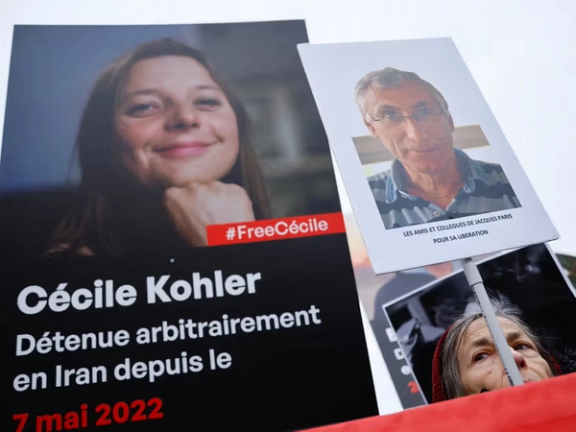
French nationals Cécile Kohler and Jacques Paris, detained in Iran since three years ago, have been charged with spying for Israel, AFP reported citing diplomatic and family sources.

French nationals Cécile Kohler and Jacques Paris, detained in Iran since three years ago, have been charged with spying for Israel, AFP reported citing diplomatic and family sources.
The pair have also been charged with "conspiracy to overthrow the regime and corruption on earth", the report added.
"All we know is that they have seen a judge who confirmed the three charges," Kohler's sister said.
Since the end of the 12-day Israeli campaign on June 24, Iran has executed several individuals and arrested hundreds of others on charges of espionage and collaboration with Israel.
Cécile Kohler and Jacques Paris were arrested in May 2022 during a tourist trip to Iran. Both were charged with espionage, which they deny. They remain in detention in Tehran.
In May, France filed a case against Iran at the International Court of Justice (ICJ), accusing Tehran of unlawfully detaining the two French citizens for three years and violating international law.
“They have been held hostage… detained in appalling conditions that amount to torture,” French Foreign Minister Jean-Noël Barrot told France 2 television. He said Iran had denied France’s requests for consular access.
Kohler, a teacher, and Paris, her partner, are the last known French citizens held in Iran. French President Emmanuel Macron has described them as “state hostages.”
France and other European Union members accuse Iran of practicing “hostage diplomacy” — detaining foreigners to pressure Western governments.
Iran denies the accusation. Its officials say the arrests followed legal procedures and reject claims of mistreatment.
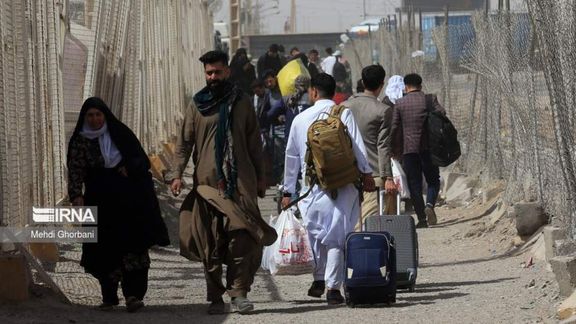
More than 1,300 activists, artists, and journalists from both Iran and Afghanistan have signed an open letter addressed to the Islamic Republic, calling for an immediate halt to the mass deportation of Afghans, which has intensified following the Israel war.
“We are well aware that the phrase ‘deportation of illegal migrants’ is a euphemism for inhumane treatment of all migrants—both legal and illegal,” the letter said.
The signatories say that while the Iranian government previously justified deportations with claims such as curbing rising unemployment, in the aftermath of the 12-day war with Israel, it has begun using new allegations—accusing some Afghans of being “key espionage elements and part of an infiltration network.”
Following the ceasefire with Israel, Iran launched a sweeping crackdown on Afghan migrants, targeting them for deportation under alleged national security concerns, according to officials and media reports.
According to Afghanistan International, Iranian police in multiple cities have been confiscating Afghan migrants’ mobile phones, citing suspicions of “communication with Israel.”
Migrants—even those with valid residency documents—have reported being stopped at checkpoints or avoiding travel for fear of arrest.
Iran’s interior minister said on Wednesday that 400,000 foreign nationals have been deported over the past four months.
“The injustice currently being inflicted on Afghans and other voiceless minorities is, above all, a betrayal of the core values we uphold—humanity, justice, and freedom,” the letter reads.
Some prominent dissident public figures, including actresses Taraneh Alidoosti and Lili Farhadpour as well as human rights lawyer Mehrangiz Kar are among the signatories.
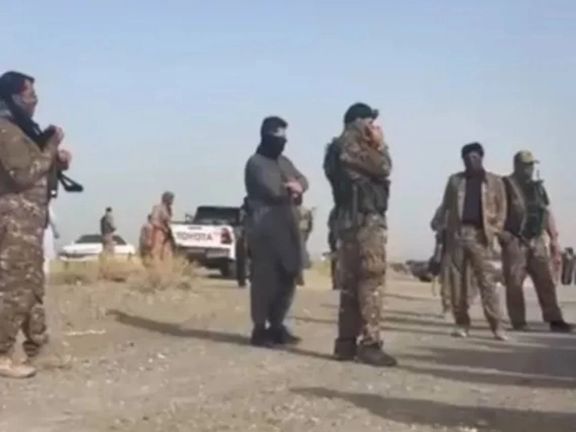
Iran's Islamic Revolutionary Guards Corps (IRGC) says it has killed or detained 52 people in southeastern Iran, describing the targets as Israel-linked terrorist elements.
“Five individuals mainly foreign nationals involved in drone sabotage operations remain at large,” the statement said, adding that the accused were working with Israeli intelligence services.
There was no mention of the numbers of killed or arrested, nor names or details of the operations.
It followed reports on Tuesday by state-linked Tasnim news agency which said two were killed and 50 arrested in operations over the past fortnight in Sistan-Baluchestan province.
“The operation targeted elements affiliated with terrorist groups in the east, aiming to spread insecurity and conduct sabotage against key infrastructure and economic assets,” the Quds Base said.
The announcements come amid an intense crackdown which has taken place across Iran since the outbreak of war between the Islamic Republic and Israel, which has seen over 700 people arrested on allegations of working with Israel.
The southeastern province, notorious for having been especially restive since the 2022 Zahedan massacre, has again been the focus of the latest crackdowns.
According to the Halvash website, security forces stormed the village of Gunich in Khash County on Tuesday, firing at protesting residents.
One woman, identified as Khan-Bibi Bameri, was killed. Eleven other women, including four under the age of 18, were seriously wounded. Two of the injured remain in critical condition in intensive care at Khomeini Hospital in Khash, the report said.
Another woman named Reyhaneh Bameri, who was pregnant, lost her fetus after being kicked and shot with pellets by agents, Halvash reported.
“Security personnel opened fire without warning on villagers protesting their conduct,” the rights group said in a statement.
“This crime occurred despite the absence of any men in the village," they added, citing eyewitnesses.
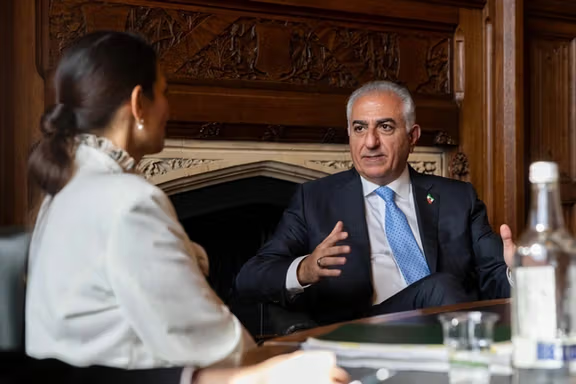
Iran’s exiled prince has called on the UK government to take stronger action against the Islamic Revolutionary Guard Corps (IRGC), warning that it poses a direct threat to British citizens.
“The UK cannot allow the IRGC to threaten British people on British soil,” Prince Reza Pahlavi posted Tuesday on X, calling on Europe to “wake up” and increase pressure on Tehran.
Pahlavi made the remarks after a meeting with former UK home secretary Priti Patel, whom he praised for having recognized the threat “firsthand.”
"The solution is to put maximum pressure on the regime so the Iranian people can end its reign of terror."
His comments came a day after his visit to the House of Commons, where he took part in a cross-party roundtable on Iran.
“I’m fighting so that the people of Iran, too, can have the parliamentary democracy they deserve,” he wrote, thanking MPs for their support.
Pahlavi also posted a message of solidarity with former UK Prime Minister Boris Johnson, saying they agreed on the need to end the “barbaric Islamic Republic.”
“One day soon I hope to welcome you to Tehran,” he added.
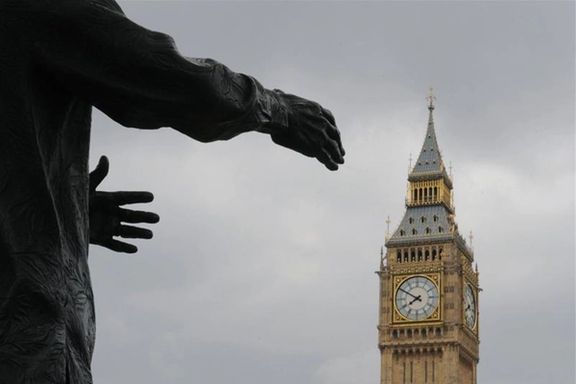
Iran is conducting a “shadow war” inside the United Kingdom that extends beyond sanctions violations and includes propaganda, financial networks, and digital disinformation campaigns aimed at dividing society, The Telegraph reported on Monday.
The article said that while the UK Treasury is investigating nine suspected violations of sanctions in 2024, “these sanctions violations are of course concerning, but only constitute a small part of Iran’s clandestine political influence and illicit finance operations in Britain.” The campaign, it said, reflects a longer-standing effort by Tehran to undermine the United Kingdom in response to decades of hostility between the two governments.
Historical context and anti-UK messaging
Tensions between the two countries go back decades, and The Telegraph noted that Iran has consistently framed the United Kingdom as a hostile power.
According to the report, this messaging forms part of a larger strategy aimed at undermining states perceived as adversaries, particularly those aligned with the United States.
Iran-linked media and advocacy in Britain
Press TV, Iran’s state-backed English-language broadcaster, previously held a broadcast license to operate in the UK. The Telegraph said that although the license was revoked in 2012, the channel continues to publish content online that promotes Iranian state positions.
The report also referenced UK-based organizations, including the Islamic Human Rights Commission, which has faced scrutiny for its messaging and continues to organize Quds Day demonstrations in central London. The Telegraph said some of these events included visible support for Hezbollah before the group was designated a terrorist organization in the UK.
Concerns over Iranian banks in London
Iranian financial institutions with past sanctions histories, including Melli Bank and Bank Saderat, still maintain offices in London, The Telegraph said. It noted that these banks operate near the Bank of England and have been raised as a concern by Members of Parliament.
According to the report, both institutions have previously been linked by international authorities to financial activities involving armed groups in the Middle East.
Online disinformation tied to Iran
Iranian influence efforts have also extended to social media, according to The Times. The paper reported that OpenAI identified a network called Storm-2035, which it said was likely linked to Tehran. The network used Persian-language prompts to generate English and Spanish posts on wedge issues, such as austerity, independence movements, and foreign policy.
OpenAI said the content was posted on X by accounts posing as local users. These accounts often used stock images and followed far more users than they had followers.
Scottish independence messaging monitored
The Telegraph also referenced Iranian involvement in online messaging around Scottish independence, citing researchers who linked the activity to broader attempts to exploit domestic divisions in the UK.
According to The Times and Scottish Daily Express, several pro-independence X accounts with apparent Iranian ties went silent after Israeli strikes on Iranian infrastructure on June 12. The Scottish Daily Express cited research from Clemson University suggesting the network may have been tied to the Islamic Revolutionary Guard Corps.
Government response limited, Telegraph says
While UK authorities have taken some action, The Telegraph said responses have so far not matched the scale of the challenge. The paper described Iran’s operations as “enabled by years of dereliction from policymakers” and said more sustained coordination would be needed to counter foreign influence campaigns effectively.
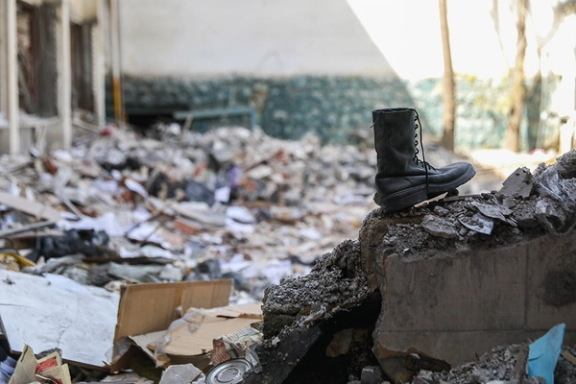
On June 23, Israel launched several missiles at Tehran’s Evin Prison, describing the notorious site as a “tool of repression.” While some Iranians initially celebrated the strike, the human cost has been heartbreaking.
Evin Prison, long a symbol of Iran’s political repression, was rocked by explosions that destroyed key facilities, including several wards, its infirmary, and the visitation hall — with immediate and devastating consequences.
Among the dead were two prison officials, Ruhollah Tavasoli and Vahid Heydarpour, as well as Evin's top prosecutor Ali Ghanaatkar. Tens of detainees, medical staff, visiting families — including a young child — and even a bystander were also killed.
A judiciary spokesman said on June 29 that 71 people had been confirmed dead, though the authorities have yet to release a full list of victims.
While Evin is widely known for holding political dissidents, journalists, students, and others charged under vague national security laws, it also houses inmates convicted of financial crimes and debt — people often awaiting bail or legal review, far removed from any political involvement.
The UN Office of the High Commissioner for Human Rights (OHCHR) condemned the strike as a “grave breach of international humanitarian law,” stressing that Evin Prison “was not a military objective.”
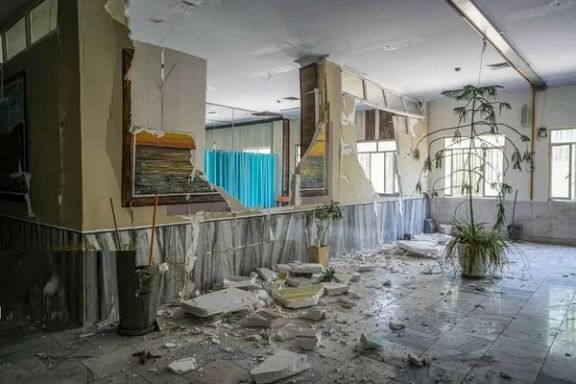
Names, not statistics
The victims of the June 23 strike are emerging not as statistics, but as lives brutally cut short.
Mehrad had accompanied his mother, Zahra Ebadi, one of seven prison social workers confirmed killed. Witnesses said Mehrad was playing in a prison playroom while his mother helped inmates draft letters.
When the first missile hit, a colleague rushed to shield him, but a concrete slab collapsed on them both. Neither survived.
Leila Jafarzadeh, a young mother of a one-year-old girl, had come to post bail for her husband, reportedly imprisoned over a financial dispute. Her body was found two days later, after her family scoured hospitals and morgues across Tehran in desperation.
Another victim, Mehrangiz Imanpour, wasn’t even inside the prison. A painter and longtime Tehran resident, she had stepped out for a walk near her home just 200 meters from the facility when the blast hit.
Her ex-husband, Reza Khandan Mahabadi, a former political prisoner, later found her body in the morgue.
“Mehrangiz was the beauty in the lives of my children,” he wrote on Instagram. “The war between two reactionary and warmongering regimes took the beauty of their lives away two days ago.”
Media reports suggest other victims included two prison doctors, a nurse, and several administrative staff and guards — many of them young conscripts, unarmed and unprepared.
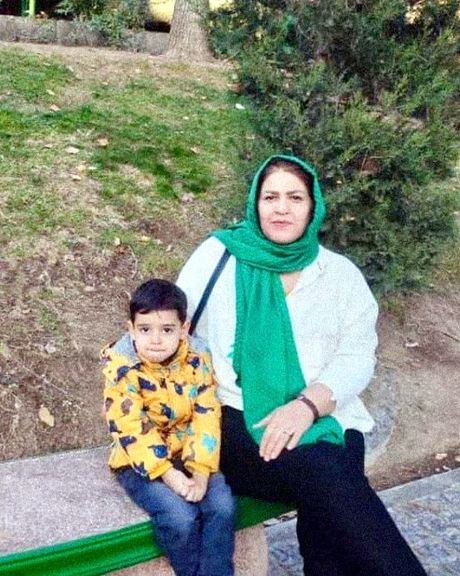
Relocation of prisoners
In the aftermath of the strike, survivors described frantic and at times violent evacuations.
“We were handcuffed, chained together and violently dragged out,” said Mostafa Tajzadeh, a prominent dissident, in a phone call to his family.
Inmates were transferred to Greater Tehran Prison, Ghezel Hesar, and the notorious Qarchak Women’s Prison, where they now face severe overcrowding, unsanitary conditions, and a shortage of food and clean water.
Some injured or ill prisoners have reportedly been denied medical treatment and left without access to vital prescription medications.
Meanwhile, many families still have no information on the fate of their loved ones.
Among the missing is Motahareh Goonei, a student activist arrested early in the Israel-Iran war after posting criticism of Iran’s leadership online. She was reportedly held in Ward 209, operated by Iran’s Ministry of Intelligence. Her family has not heard from her since the attack.
Also missing are Ahmadreza Jalali, a Swedish-Iranian physician on death row, and French nationals Cécile Kohler and Jacques Paris, who are held on widely disputed espionage charges. Their families have been denied all contact and updates.